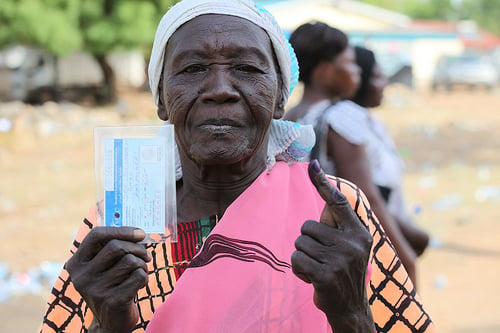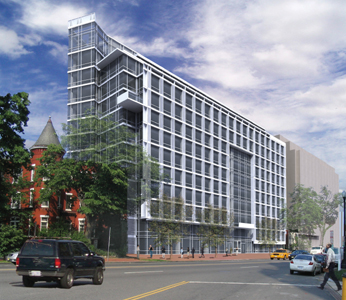|
Happy Democracy Day!

"Independence!" A woman casts her ballot in the January referendum creating the new country of South Sudan. Photo by Susan Stigant, senior program manager.
Sept. 15 is International Day of Democracy, an annual global celebration of human rights, the rule of law and other principles that unite democracies around the world. The day was designated by the United Nations to reaffirm the universality of democratic values and recognize the aspirations of people around the world to have a say in how they are governed and make free choices about how they live their lives.
Nowhere have those aspirations been more prominent this year than in North Africa, where popular uprisings have ousted dictators in Tunisia, Egypt and Libya. In Libya, the Institute has been working closely since April with the National Transitional Council (NTC) as it creates a plan for a constitution, elections, national security and the protection of civil liberties. In a country where political parties have been outlawed and maligned for 40 years, NDI is helping fledgling parties create platforms and attract supporters. Writing in the Washington Post, Les Campbell, NDI regional director for Middle East and North Africa programs, expressed optimism about the prospects of a successful transition and outlined the positive steps the council has taken already. Matyas Eörsi, resident country director in Benghazi, spoke to NPR about the high expectations — globally and in Libya — facing the country's new government.
For more than 25 years, in more than 70 countries, NDI has worked to strengthen new and emerging democracies. This Democracy Day, consider contributing to our work and support people in North Africa and around the world who want a voice in how their countries are governed.
|
|
Pakistan to Extend Political Reforms to FATA
President Asif Ali Zardari's recent decision to extend political and legal reforms to Pakistan's Federally Administered Tribal Areas (FATA) is the result of a lengthy effort by political parties and other organizations to bring more democratic systems of governance to a region considered a haven for militants and religious extremists. The reforms, supported by NDI, will allow political parties to form and operate in FATA for the first time, and will amend a draconian criminal code first enacted by the British in 1848.
Ensuring Women and Young People Take Part in the Political Process
Women and youth have a significant role to play in new and emerging democracies. In Sudan, caricature art helps engage young people who feel excluded from the political process. In Burkina Faso and Iraq, women are learning the skills they need to run for office and build successful political careers. In Nicaragua, the first class of graduates to earn a certificate in leadership and political management are ready to start their political careers. And in Afghanistan, one young woman is helping others prepare for careers in government by starting an internship program that places students in provincial council offices.
Celebrate Democracy with these Upcoming Events
Save the date! NDI will hold its annual democracy dinner on Nov. 7. Secretary of State Hillary Clinton will headline the event, which also includes a panel discussion on the Arab Spring. The dinner and an awards ceremony will recognize those who have spent a lifetime supporting democracy.
On Sept. 23, Alassane Ouattara, president of Côte d'Ivoire, will speak at NDI, where he will discuss his government's efforts to rebuild the country's economy and foster national reconciliation in the wake of violence following last November's election. This event is full, but will be streamed live.
|
|
Toward Better Elections in Africa
Across Africa, countries are taking steps to ensure more transparent and accountable elections. A recent referendum in Liberia was monitored by the Elections Coordinating Committee, a civil society coalition that provided a nonpartisan assessment of the process and will monitor upcoming presidential and legislative elections. In Côte d'Ivoire, which recently experienced a violent crisis in the aftermath of its November presidential election, citizen election monitors gathered to discuss their role in mitigating violence in legislative polls scheduled for later this year. And in Zambia and Mauritania, NDI fielded delegations that assessed both countries' preparedness for upcoming elections and suggested improvements.
Coming Together for Common Goals
Democracy can't solve longstanding political or cultural divisions overnight, but it can bring different groups together to discuss issues and arrive at common goals. In Bosnia, eight politicians are reaching across party and ethnic lines to tackle the country's biggest challenges together. And in Honduras, where the effects of a 2009 coup and constitutional crisis are still reverberating, a series of "democracy dialogues" is bringing people together to find common ground.
Public Opinion Research for Better Policy Platforms
Public opinion research helps political parties and governments address the issues their constituents care about most. In Iraq, people want politicians to focus on jobs, the economy, and water and power delivery. In Somalia, focus group research shows that citizens are losing faith in their transitional institutions and are looking for ways to provide ideas to move their country forward. In Belarus, citizens distrust the Lukashenko regime and blame it for current economic problems. But they remain pessimistic about the prospects for opposition parties. And in South Sudan, citizens want to end tribalism above all else, seeing themselves primarily as Southern Sudanese.
|
NDI's Washington Office is Moving
 NDI's new office
|
|
Update your address book! As of Sept. 19, NDI's Washington, D.C., headquarters will be located at 455 Massachusetts Ave., NW, on the eighth floor. All telephone numbers will remain the same.
|